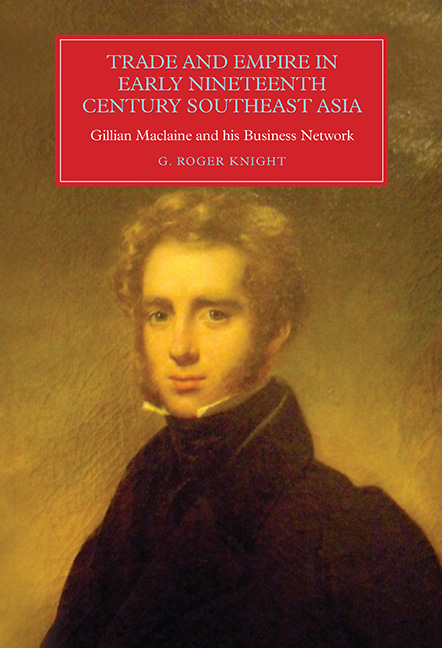 Trade and Empire in Early Nineteenth-Century Southeast Asia
Trade and Empire in Early Nineteenth-Century Southeast Asia Book contents
- Frontmatter
- Contents
- Acknowledgements
- Abbreviations
- Map of Maritime Asia: Trade and Empire, c. 1830
- Preface
- Map of South Central Java, c. 1830
- 1 Introduction: A Scots Émigré, Imperial Systems and Global Commodities
- 2 Maclaine’s ‘Apprenticeship’: The City of London and the Cotton Trade with Asia, 1816–20
- 3 A ‘Scotch Adventurer’: Batavia, Coffee and Colonial Wars, 1820–27
- 4 The Pivotal Years: ‘Maclaine Watson’, Treacherous Chains, Sickness and Debt, 1827–32
- 5 The Network Takes Shape: Connections, Business and Associates, 1832–40
- 6 Conclusion: Maclaine’s Legacy, Commodities and Trade on a Colonial ‘Periphery’, 1840–1964
- Bibliography
- Index
- Worlds of the East India Company
1 - Introduction: A Scots Émigré, Imperial Systems and Global Commodities
Published online by Cambridge University Press: 17 June 2021
- Frontmatter
- Contents
- Acknowledgements
- Abbreviations
- Map of Maritime Asia: Trade and Empire, c. 1830
- Preface
- Map of South Central Java, c. 1830
- 1 Introduction: A Scots Émigré, Imperial Systems and Global Commodities
- 2 Maclaine’s ‘Apprenticeship’: The City of London and the Cotton Trade with Asia, 1816–20
- 3 A ‘Scotch Adventurer’: Batavia, Coffee and Colonial Wars, 1820–27
- 4 The Pivotal Years: ‘Maclaine Watson’, Treacherous Chains, Sickness and Debt, 1827–32
- 5 The Network Takes Shape: Connections, Business and Associates, 1832–40
- 6 Conclusion: Maclaine’s Legacy, Commodities and Trade on a Colonial ‘Periphery’, 1840–1964
- Bibliography
- Index
- Worlds of the East India Company
Summary
Gillian Maclaine (he spelled his first name that way throughout his life) lightheartedly styled himself early in his career in the East as a ‘Scotch Adventurer’. Yet, this was too modest a designation for an individual who went on to found a major and enduring mercantile business in colonial Indonesia and who, when he first arrived on the island of Java at the beginning of the 1820s, was both well educated and had several years of commercial experience behind him in the UK. Like many of his European counterparts, his career located him in the realms of Western empire-building in nineteenth-century Asia. More specifically, as we shall see, like so many of his British contemporaries, his own personal trajectory was framed within the context of the ongoing history of the British East India Company (EIC) that formed a ubiquitous presence in the world in which Maclaine operated. Even so, his location there was distinctive – though hardly unique – in so far as his activities as both merchant and planters straddled two very different empires: the British one from which he heralded and the Dutch one in the Netherlands Indies where he worked and settled. The imperial context in which he was enmeshed, however, was integrated with a global one that, in part, subsumed it.
For Maclaine was not only positioned, at times somewhat awkwardly, along one of the nineteenth century's (lesser) imperial fault lines. At least as crucially, he was positioned along commodity chains that extended between the Americas, Europe and the heartlands of Asia and whose key dynamics, though far from independent of ‘empire’, nonetheless exhibited a substantial degree of autonomy from it. At the same time, however, Maclaine's engagement in commodity chains is easily misunderstood, particularly so, indeed, if those chains are viewed (predominantly or exclusively) in terms of a ‘World System’ that subordinated a (colonial) ‘periphery’ of raw material production to a (metropolitan) manufacturing ‘core’.
In fact, Maclaine's activity on the colonial ‘periphery’ of empire complicates significantly any notion that he was thereby subservient to, or simply the agent of, metropolitan ‘core’ interests in whatever form. His career in the Indies certainly started that way.
- Type
- Chapter
- Information
- Trade and Empire in Early Nineteenth-Century Southeast AsiaGillian Maclaine and his Business Network, pp. 1 - 24Publisher: Boydell & BrewerPrint publication year: 2015


